Answered step by step
Verified Expert Solution
Question
1 Approved Answer
Mark Coglin, the owner and general manager of House, Hearth and Home, a large hardware, furniture and building centre, faced a dilemma about whether
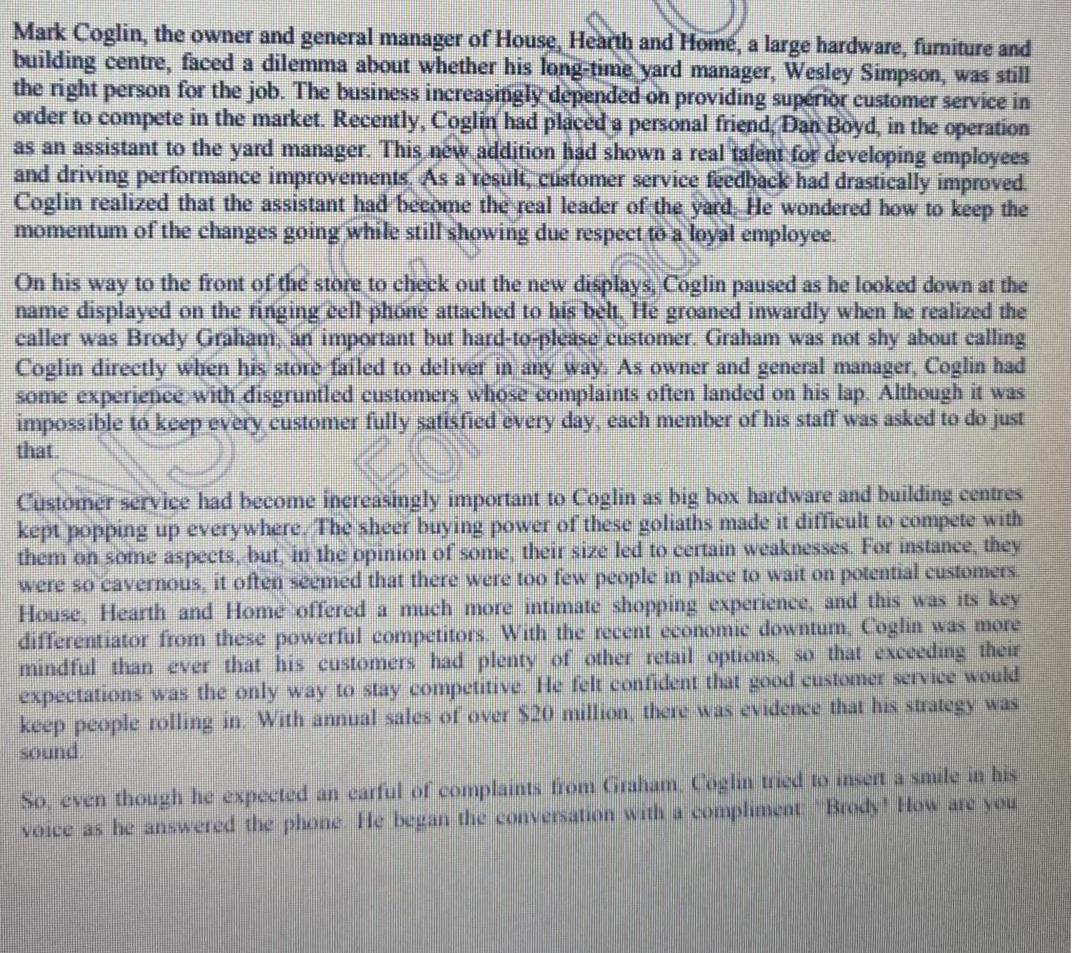
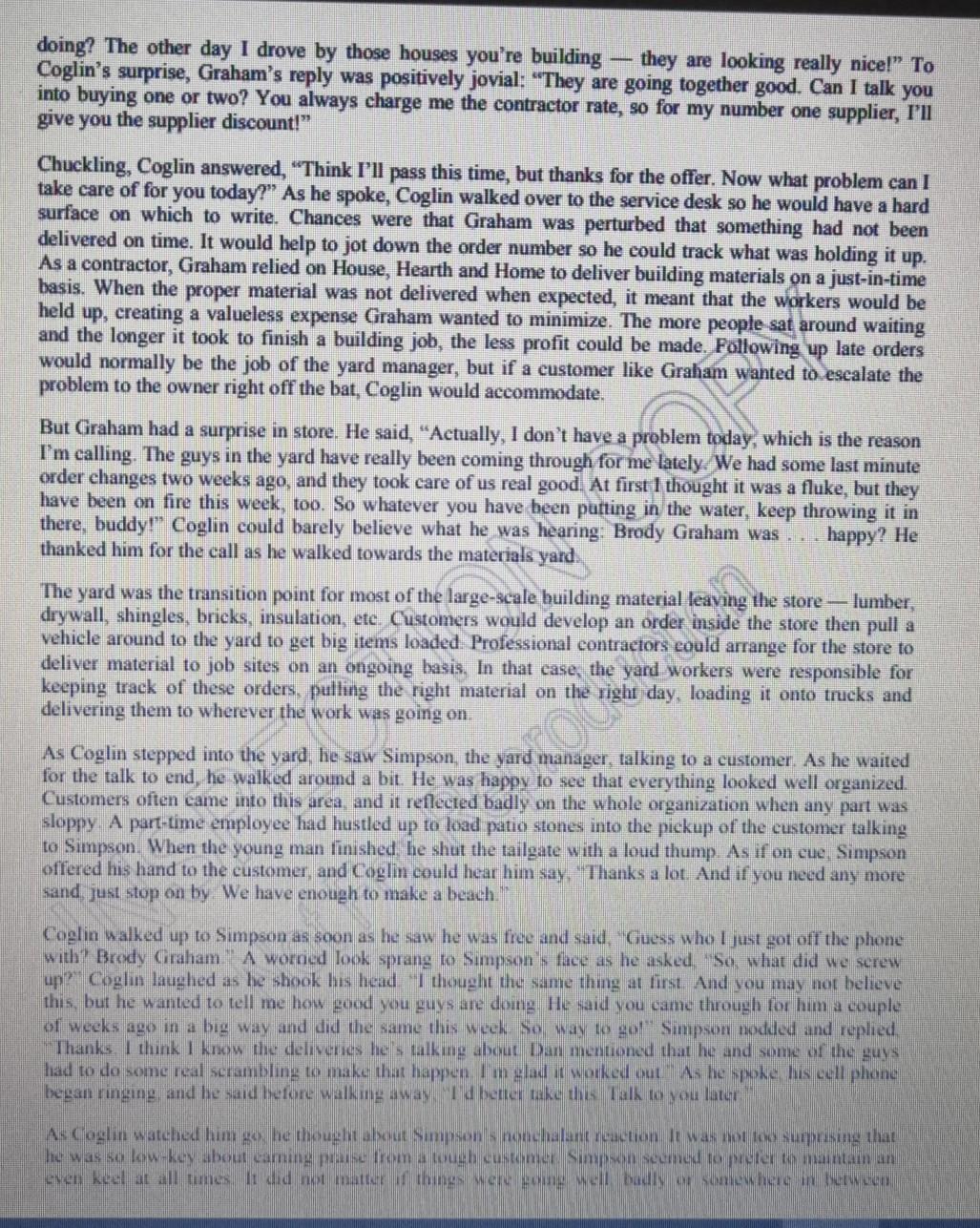
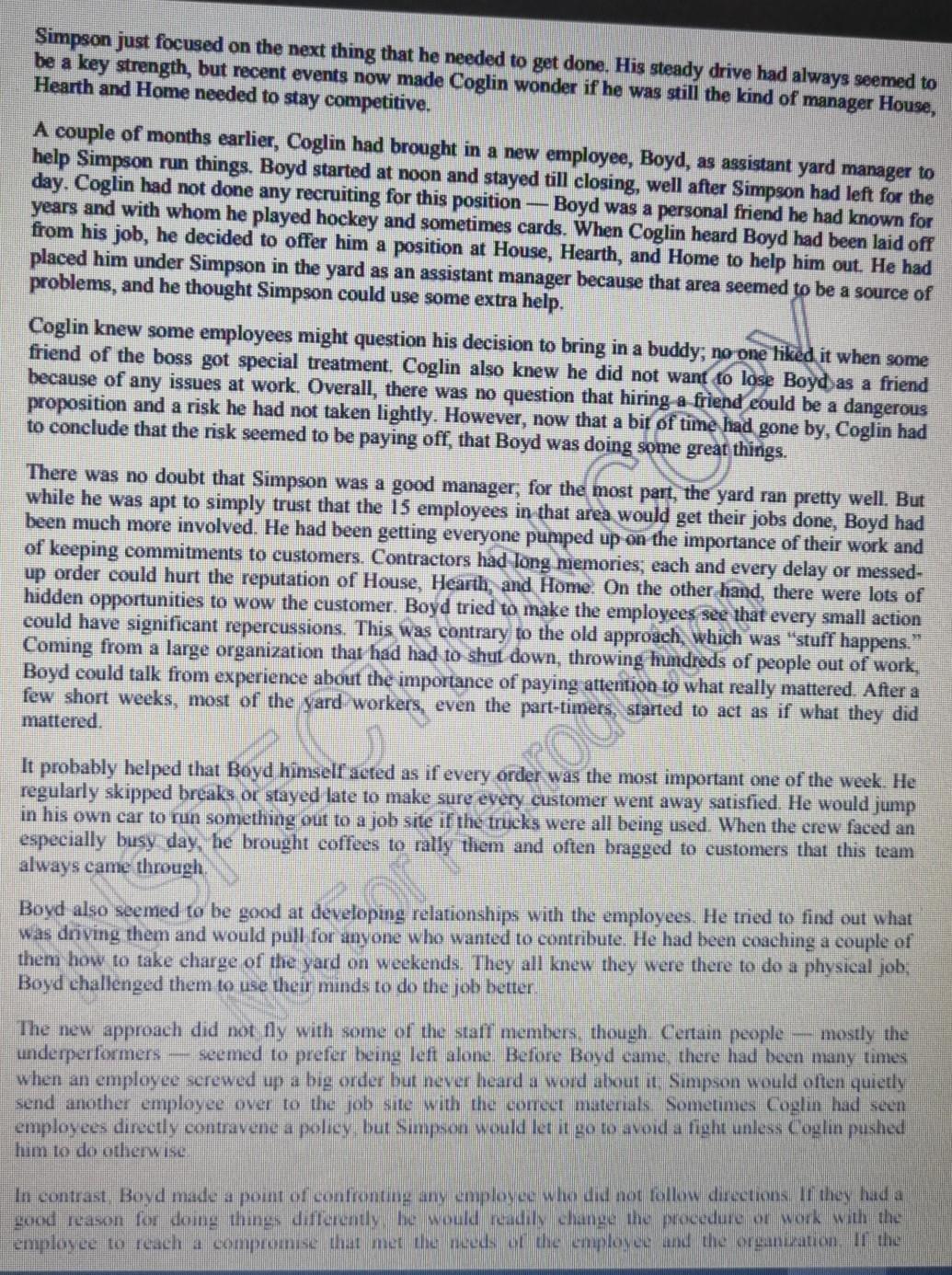
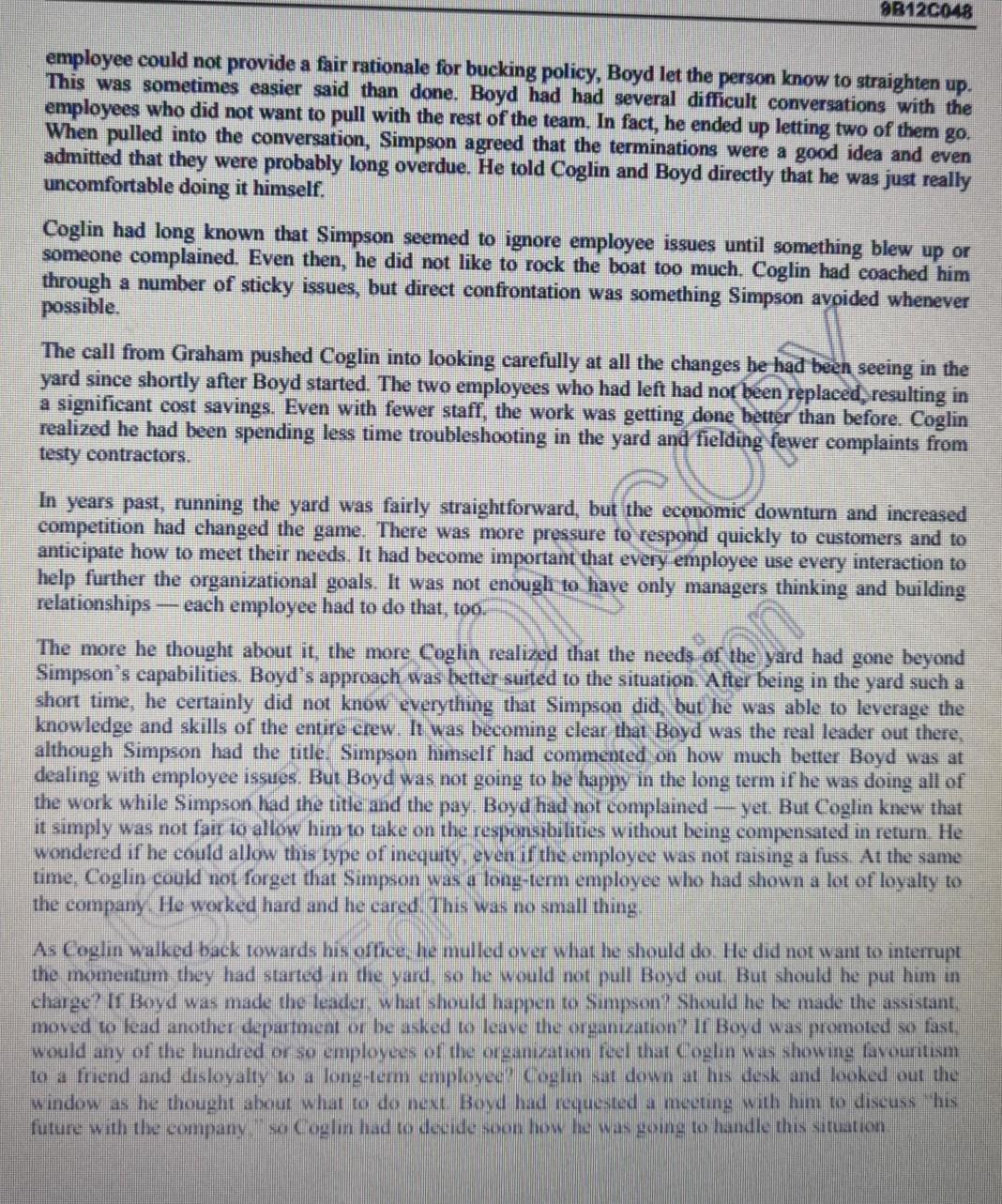
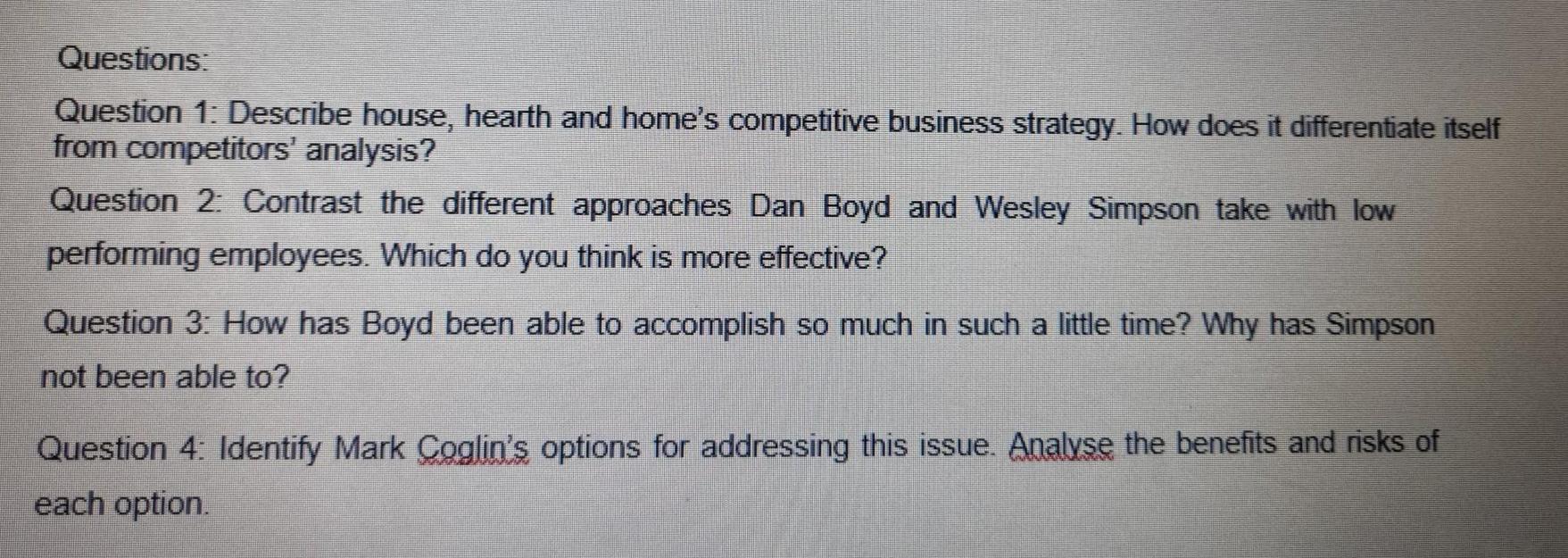
Mark Coglin, the owner and general manager of House, Hearth and Home, a large hardware, furniture and building centre, faced a dilemma about whether his long-time yard manager, Wesley Simpson, was still the right person for the job. The business increasingly depended on providing superior customer service in order to compete in the market. Recently, Coglin had placed a personal friend, Dan Boyd, in the operation as an assistant to the yard manager. This new addition had shown a real talent for developing employees and driving performance improvements. As a result, customer service feedback had drastically improved. Coglin realized that the assistant had become the real leader of the yard. He wondered how to keep the momentum of the changes going while still showing due respect loyal employee. On his way to the front of the store to check out the new displays, Coglin paused as he looked down at the name displayed on the ringing cell phone attached to his beli, He groaned inwardly when he realized the caller was Brody Graham, an important but hard-to-please customer. Graham was not shy about calling Coglin directly when his store failed to deliver in any way. As owner and general manager, Coglin had some experience with disgruntled customers whose complaints often landed on his lap. Although it was impossible to keep every customer fully satisfied every day, each member of his staff was asked to do just that. STAT Customer service had become increasingly important to Coglin as big box hardware and building centres kept popping up everywhere. The sheer buying power of these goliaths made it difficult to compete with them on some aspects, but, in the opinion of some, their size led to certain weaknesses. For instance, they were so cavernous, it often seemed that there were too few people in place to wait on potential customers. House, Hearth and Home offered a much more intimate shopping experience, and this was its key differentiator from these powerful competitors. With the recent economic downturn, Coglin was more mindful than ever that his customers had plenty of other retail options, so that exceeding their expectations was the only way to stay competitive. He felt confident that good customer service would keep people rolling in. With annual sales of over $20 million, there was evidence that his strategy was sound. So, even though he expected an earful of complaints from Graham Coglin tried to insert a smile in his voice as he answered the phone. He began the conversation with a compliment Brody! How are you doing? The other day I drove by those houses you're building - they are looking really nice!" To Coglin's surprise, Graham's reply was positively jovial: "They are going together good. Can I talk you into buying one or two? You always charge me the contractor rate, so for my number one supplier, I'll give you the supplier discount!" Chuckling, Coglin answered, "Think I'll pass this time, but thanks for the offer. Now what problem can I take care of for you today?" As he spoke, Coglin walked over to the service desk so he would have a hard surface on which to write. Chances were that Graham was perturbed that something had not been delivered on time. It would help to jot down the order number so he could track what was holding it up. As a contractor, Graham relied on House, Hearth and Home to deliver building materials on a just-in-time basis. When the proper material was not delivered when expected, it meant that the workers would be held up, creating a valueless expense Graham wanted to minimize. The more people sat around waiting and the longer it took to finish a building job, the less profit could be made. Following up late orders would normally be the job of the yard manager, but if a customer like Graham wanted to escalate the problem to the owner right off the bat, Coglin would accommodate. But Graham had a surprise in store. He said, "Actually, I don't have a problem today, which is the reason I'm calling. The guys in the yard have really been coming through for me lately. We had some last minute order changes two weeks ago, and they took care of us real good. At first I thought it was a fluke, but they have been on fire this week, too. So whatever you have been putting in the water, keep throwing it in there, buddy!" Coglin could barely believe what he was hearing: Brody Graham was. happy? He thanked him for the call as he walked towards the materials yard. The yard was the transition point for most of the large-scale building material leaving the store - lumber, drywall, shingles, bricks, insulation, etc. Customers would develop an order inside the store then pull a vehicle around to the yard to get big items loaded Professional contractors could arrange for the store to deliver material to job sites on an ongoing basis. In that case, the yard workers were responsible for keeping track of these orders, pulling the right material on the right day, loading it onto trucks and delivering them to wherever the work was going on. As Coglin stepped into the yard, he saw Simpson, the yard manager, talking to a customer. As he waited for the talk to end, he walked around a bit. He was happy to see that everything looked well organized. Customers often came into this area, and it reflected badly on the whole organization when any part was sloppy. A part-time employee had hustled up to load patio stones into the pickup of the customer talking to Simpson. When the young man finished, he shut the tailgate with a loud thump. As if on cue, Simpson offered his hand to the customer, and Coglin could hear him say, "Thanks a lot. And if you need any more sand, just stop on by. We have enough to make a beach." Coglin walked up to Simpson as soon as he saw he was free and said, "Guess who I just got off the phone with Brody Graham." A worried look sprang to Simpson's face as he asked, "So, what did we screw up? Coglin laughed as he shook his head. "I thought the same thing at first. And you may not believe this, but he wanted to tell me how good you guys are doing. He said you came through for him a couple of weeks ago in a big way and did the same this week. So, way to go!" Simpson nodded and replied. Thanks. I think I know the deliveries he's talking about Dan mentioned that he and some of the guys had to do some real scrambling to make that happen. I'm glad it worked out" As he spoke his cell phone began ringing, and he said before walking away. I'd better take this Talk to you later As Coglin watched him go, he thought about Simpson's nonchalant reaction. It was not too surprising that he was so low-key about earning praise from a tough customer Simpson seemed to prefer to maintain an even keel at all times. It did not matter if things were going well badly or somewhere in between Simpson just focused on the next thing that he needed to get done. His steady drive had always seemed to be a key strength, but recent events now made Coglin wonder if he was still the kind of manager House, Hearth and Home needed to stay competitive. A couple of months earlier, Coglin had brought in a new employee, Boyd, as assistant yard manager to help Simpson run things. Boyd started at noon and stayed till closing, well after Simpson had left for the day. Coglin had not done any recruiting for this position - Boyd was a personal friend he had known for years and with whom he played hockey and sometimes cards. When Coglin heard Boyd had been laid off from his job, he decided to offer him a position at House, Hearth, and Home to help him out. He had placed him under Simpson in the yard as an assistant manager because that area seemed to be a source of problems, and he thought Simpson could use some extra help. Coglin knew some employees might question his decision to bring in a buddy; no one liked it when some friend of the boss got special treatment. Coglin also knew he did not want to lose Boyd as a friend because of any issues at work. Overall, there was no question that hiring a friend could be a dangerous proposition and a risk he had not taken lightly. However, now that a bit of time had gone by, Coglin had to conclude that the risk seemed to be paying off, that Boyd was doing some great things. There was no doubt that Simpson was a good manager, for the most part, the yard ran pretty well. But while he was apt to simply trust that the 15 employees in that area would get their jobs done, Boyd had been much more involved. He had been getting everyone pumped up on the importance of their work and of keeping commitments to customers. Contractors had long memories; each and every delay or messed- up order could hurt the reputation of House, Hearth, and Home. On the other hand, there were lots of hidden opportunities to wow the customer. Boyd tried to make the employees see that every small action could have significant repercussions. This was contrary to the old approach, which was "stuff happens. Coming from a large organization that had had to shut down, throwing hundreds of people out of work, Boyd could talk from experience about the importance of paying attention to what really mattered. After a few short weeks, most of the yard workers, even the part-time started to act as if what they did mattered. It probably helped that Boyd himself acted as if every orde was the most important one of the week. He regularly skipped breaks or stayed late to make sure every customer went away satisfied. He would jump in his own car to run something out to a job site if the trucks were all being used. When the crew faced an especially busy day, he brought coffees to rally them and often bragged to customers that this team always came through. Boyd also seemed to be good at developing relationships with the employees. He tried to find out what was driving them and would pull for anyone who wanted to contribute. He had been coaching a couple of them how to take charge of the yard on weekends. They all knew they were there to do a physical job, Boyd challenged them to use their minds to do the job better. The new approach did not fly with some of the staff members, though. Certain people underperformers mostly the seemed to prefer being left alone. Before Boyd came, there had been many times when an employee screwed up a big order but never heard a word about it. Simpson would often quietly send another employee over to the job site with the correct materials. Sometimes Coglin had seen employees directly contravene a policy, but Simpson would let it go to avoid a fight unless Coglin pushed him to do otherwise. In contrast, Boyd made a point of confronting any employee who did not follow directions. If they had a good reason for doing things differently, he would readily change the procedure or work with the employee to reach a compromise that met the needs of the employee and the organization. If the 9812C048 employee could not provide a fair rationale for bucking policy, Boyd let the person know to straighten up. This was sometimes easier said than done. Boyd had had several difficult conversations with the employees who did not want to pull with the rest of the team. In fact, he ended up letting two of them go. When pulled into the conversation, Simpson agreed that the terminations were a good idea and even admitted that they were probably long overdue. He told Coglin and Boyd directly that he was just really uncomfortable doing it himself. Coglin had long known that Simpson seemed to ignore employee issues until something blew up or someone complained. Even then, he did not like to rock the boat too much. Coglin had coached him through a number of sticky issues, but direct confrontation was something Simpson avoided whenever possible. The call from Graham pushed Coglin into looking carefully at all the changes he had been seeing in the yard since shortly after Boyd started. The two employees who had left had not been replaced, resulting in a significant cost savings. Even with fewer staff, the work was getting done better than before. Coglin realized he had been spending less time troubleshooting in the yard and fielding fewer complaints from testy contractors. In years past, running the yard was fairly straightforward, but the economic downturn and increased competition had changed the game. There was more pressure to respond quickly to customers and to anticipate how to meet their needs. It had become important that every employee use every interaction to help further the organizational goals. It was not enough to have only managers thinking and building relationships - each employee had to do that, too. The more he thought about it, the more Coglin realized that the needs of the yard had gone beyond Simpson's capabilities. Boyd's approach was better suited to the situation. After being in the yard such a short time, he certainly did not know everything that Simpson did, but he was able to leverage the knowledge and skills of the entire crew. It was becoming clear that Boyd was the real leader out there, although Simpson had the title. Simpson himself had commented on how much better Boyd was at dealing with employee issues. But Boyd was not going to be happy in the long term if he was doing all of the work while Simpson had the title and the pay. Boyd had not complained -yet. But Coglin knew that it simply was not fair to allow him to take on the responsibilities without being compensated in return. He wondered if he could allow this type of inequity, even if the employee was not raising a fuss. At the same time, Coglin could not forget that Simpson was a long-term employee who had shown a lot of loyalty to the company. He worked hard and he cared. This was no small thing. on As Coglin walked back towards his office, he mulled over what he should do. He did not want to interrupt the momentum they had started in the yard, so he would not pull Boyd out. But should he put him in charge? If Boyd was made the leader, what should happen to Simpson? Should he be made the assistant, moved to lead another department or be asked to leave the organization? If Boyd was promoted so fast, would any of the hundred or so employees of the organization feel that Coglin was showing favouritism to a friend and disloyalty to a long-term employee" Coglin sat down at his desk and looked out the window as he thought about what to do next. Boyd had requested a meeting with him to discuss his future with the company," so Coglin had to decide soon how he was going to handle this situation Questions: Question 1: Describe house, hearth and home's competitive business strategy. How does it differentiate itself from competitors' analysis? Question 2: Contrast the different approaches Dan Boyd and Wesley Simpson take with low performing employees. Which do you think is more effective? Question 3: How has Boyd been able to accomplish so much in such a little time? Why has Simpson not been able to? Question 4: Identify Mark Coglin's options for addressing this issue. Analyse the benefits and risks of each option.
Step by Step Solution
★★★★★
3.38 Rating (160 Votes )
There are 3 Steps involved in it
Step: 1
1 House Hearth and Home s competitive business strategy is to focus on providing superior customer service This includes offering a more intimate shopping experience than its competitors as well as be...
Get Instant Access to Expert-Tailored Solutions
See step-by-step solutions with expert insights and AI powered tools for academic success
Step: 2

Step: 3

Ace Your Homework with AI
Get the answers you need in no time with our AI-driven, step-by-step assistance
Get Started


